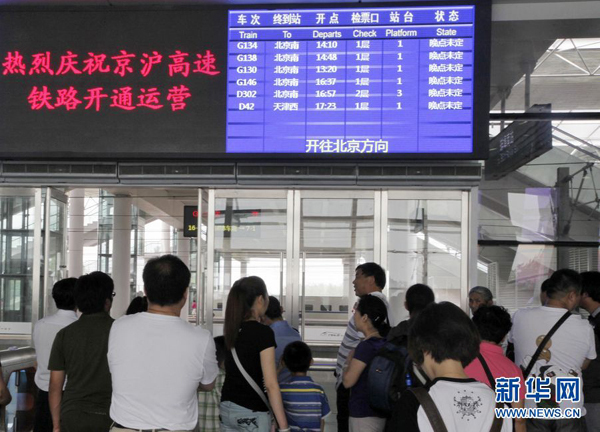Gov't pledges better operation of high-speed railway
 0 Comment(s)
0 Comment(s) Print
Print E-mail
Xinhua, July 15, 2011
E-mail
Xinhua, July 15, 2011
Chinese railway authorities are making all efforts to iron out problems with the Beijing-Shanghai high-speed railway and hoping for more public understanding and support on the project, a railway official said Thursday.
|
|
|
One of the high-speed trains heading for Beijing broke down on July 12, 201, and passengers had to change trains to complete their journey. |
Wang Yongping, spokesman with the Ministry of Railways, apologized on Thursday for three delays on the newly-built railway over the last five days during an online chat hosted by people.com.cn, the online arm of China's People's Daily.
Currently, there was more likelihood of problems arising as the railway line had just opened, he said.
One of the high-speed trains heading for Beijing broke down on Wednesday, and hundreds of passengers had to change trains to complete their journey. Power failures halted 19 trains on Sunday and 29 others on Tuesday.
The 1,318-km Beijing-Shanghai high-speed railway went into operation on June 30. The train trip between the two cities takes less than five hours.
The Wednesday incident was caused by a failure in the tractive transformers on the train, which lead to a drop in speed to 160 km per hour. The railway is designed to handle maximum train speeds of 350 km per hour.
Local authorities transferred the passengers to a spare train because its slow speed would have compromised other train trips running on the same line, said Wang.
"These malfunctions had not caused any major safety risks, but they have truly affected the railway's operation," he said.
Wang said the railway was designed to be "sensitive" to safety risks, therefore, the trains had immediately to stop running in case of a power failure or bad weather.
High winds and thunderstorms caused an equipment failure in a high-speed train on Sunday when it was passing through Shandong Province.
The trains have reliable safety monitoring systems, which "might sometimes affect travelling," but could help avoid railway accidents and protect passengers from safety risks, said Wang.
Wang admitted that railway authorities should increase capabilities to prevent equipment failures and deal with emergencies.
Malfunctions were very likely to happen as the railway had just started operating, but railway regulators will try their best to stabilize its performance, he said.
Wang promised the railway ministry would conduct a thorough safety check on the high-speed railway system and optimize the operation.
Authorities will further improve emergency response plans, which were established before the railway was put into operation, including passenger evacuation and aid repairs. Enhanced training will be offered to staff on the trains.
Sun Zhang, a researcher with the Shanghai-based Tongji University, said the railway operator should also strengthen communications to passengers and other departments.
There would be fewer disputes if train attendants could clearly explain what had happened to the passengers instead of simply saying "there will be a temporary stop," he said.
Railway authorities should also get timely weather information from weather observatories, so that the train operators can find solutions to unfavorable weather conditions as early as possible, he added.
The Beijing-Shanghai high-speed railway has carried an average of 165,000 passengers each day from July 1 to 13, with highest daily transportation volume of 197,000 people, according to Wang.
Go to Forum >>0 Comment(s)
 Add your comments...
Add your comments...
- User Name Required
- Your Comment
- Racist, abusive and off-topic comments may be removed by the moderator.






